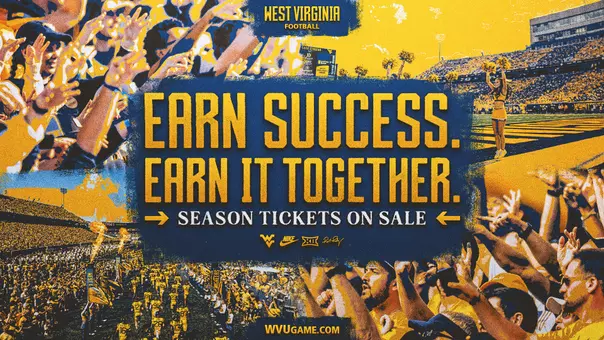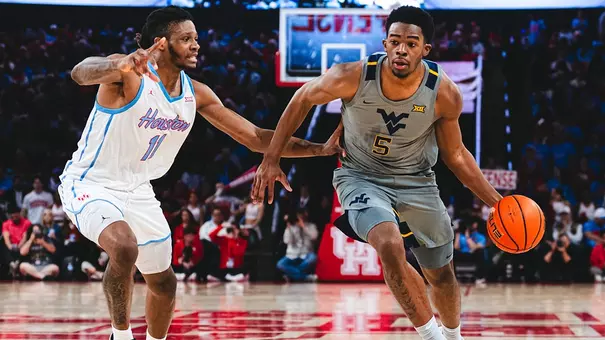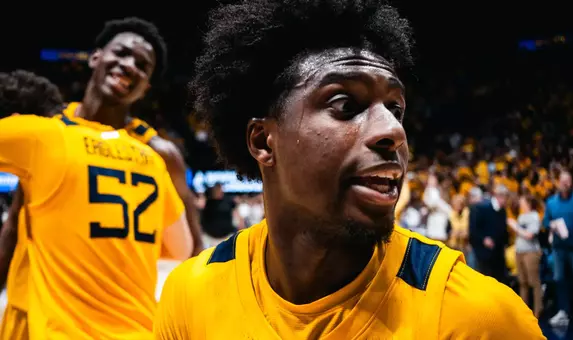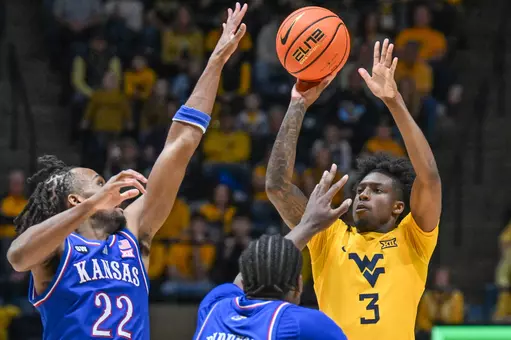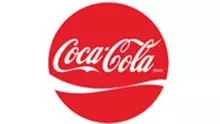
Photo by: All Pro Photography/Dale Sparks
Clarksburg's Patrick Proud of His Mountain State Roots
February 28, 2018 09:16 AM | Football, Men's Basketball, Blog
MORGANTOWN, W.Va. - For those of us in now our 40s, 50s and 60s, Mike Patrick's voice on ESPN covering college and professional sports provided the soundtrack to our generation. His timing, humor, intelligence and enthusiasm made the bad games seem good and the good games seem great.
Patrick, who grew up in the Chestnut Hills area of Clarksburg, said one of the biggest lessons he ever learned in broadcasting came from another broadcasting legend, Dick Enberg: Make what you are doing at that moment seem like the most important thing in the world.
"I loved Dick Enberg, and I thought he was so good," Patrick said last week from his Northern Virginia home. "He always made me feel like he was at the most important event that he had ever been to. It could be a middle-of-the-season game in college basketball, but he made the people who watched the game feel like they didn't want to be anywhere else on the face of the Earth, and that's always what I tried to do because I felt that way."
In the late 1980s and early 1990s, Mike Patrick and Ron Franklin were the megastars of ESPN's college sports coverage.
Franklin had sort of a Ron Burgundy persona in that he was always Mr. Broadcaster and sometimes took himself a little too seriously. I can recall many years ago when Franklin was working a West Virginia football game and he was reluctant to have idle conversation with the sports information people because he was saving his voice for the game broadcast the following evening.
He'd rather sip warm tea and read the game notes, his handlers said. On the other hand, Patrick always took what he did seriously, but never himself.
"When people stop and ask me for an autograph, I still think of this little kid from West Virginia, 'Why in the hell are they asking me for my autograph?'" Patrick said. "It never dawned on me that people care like that. It's stunning."
What Patrick has accomplished during his fabulous 36-year run with ESPN, ending last week, is nothing short of stunning, especially for the Clarksburg kid who had dreams of becoming a professional baseball player.
Growing up in Clarksburg back in the late 1950s was like tearing a page right out of Norman Rockwell's Saturday Evening Post.
"It was a wonderful place to grow up," Patrick said. "Clarksburg was the perfect little city. It was the Glass Capital of the World; there was full employment and of course back then, I was so naïve I wouldn't have known the difference anyway. It was just a special place, and it had everything a kid like me could want."
His summer evenings were filled listening to Harry Carey and Jack Buck broadcast St. Louis Cardinal games on his portable radio, his body usually contorted in a 45-degree angle so he could hear every third word they were saying.
He also loved listening to the West Virginia University football and basketball games airing on his hometown radio station, WBOY. Jack Fleming's descriptive style and enthusiasm for the Mountaineers made the games seem like they were happening right in Patrick's bedroom.
"The guy that really did it for me was Jack Fleming," Patrick recalled. "I thought he was the best radio play-by-play guy I ever heard. I had never been to a West Virginia game when I first started listening to him and yet I knew exactly what the stadium looked like because of his descriptions.
"I knew what the players looked like. He just told you so much about a game, and of course, he loved West Virginia so much. He was wonderful to listen to."
An impression was made.
When Mike was either in the eighth or ninth grade at Washington Irving High, he can't remember for sure, he was working the chain gang for high school games at Hite Field. He was the person responsible for holding the marker where the line of scrimmage was and the guy sitting up in the press box calling the games on the radio back then was a man named Jay Randolph, who later became a well-known name in the broadcasting business himself.
Randolph was just fresh out of college, and he couldn't see the plays inside the 10-yard-line, so he began looking for help. The resourceful Patrick suggested that he could hold up a card indicating what yard line the ball was on so that Randolph could tell exactly where the ball was when it moved inside the 10.
Problem solved.
For Patrick, it was also another subtle brush with what was later to become his life's work.
The third came when he was a junior at George Washington University, and he finally realized that baseball was not the way he was going to make a living.
One day he saw a sign that read, Do You Want to Work for WRGW?
"They needed news guys, DJs and sportscasters and I thought, 'Wouldn't that be fun? Talk about sports!' I walked upstairs and they said, 'There are only 12 people working here, when do you want to start?' I did my first show that afternoon," Patrick recalled.
He didn't have the slightest clue what he was doing, but he absolutely loved it.
"My first job, I was a disc jockey for four hours a day," Patrick said. "I did sports, I did news and I did engineering in this little radio station and I learned how much I loved the business."
Who could ever imagine spinning the Beatles, Roy Orbison, The Honeycombs, J. Frank Wilson & the Cavaliers, Manfred Mann, Billy J. Kramer & The Dakotas and The Serendipity Singers on a low-powered student radio station in downtown Washington, D.C., could lead to anything more than just a couple of extra bucks in his pocket on the weekends?
But it did.
And it was then he first learned how to think on his feet.
"You've got to say something," Patrick laughed. "My problem was, I had a four-hour show and those first two hours, damn, I was good! But I used it all up in the first two hours and those second two hours I was just awful! It was time and temperature, that was it.
"But those first two hours, man, I was cooking!"
Those first two "good hours" at WRGW led to a radio job in Somerset, Pennsylvania, and eventually he got to Jacksonville, Florida, where he was able to raise his profile as the sports director at WJXT-TV.
He also began calling University of Jacksonville basketball games, which led to a job in the fall working the World Football League's Jacksonville Sharks games on local television. His work there led to a job at WJLA-TV back in D.C. and play-by-play work for Maryland and Washington Redskins preseason games.
"I got to be a homer and say 'we' and 'us' and God it was fun," Patrick said. "I was offered a job at the ABC station in DC, channel 7, and was offered it three times. The third time the guy said, 'This is the last one' and I said, 'Okay, I'll take it.'"
Patrick worked there as a sports reporter and weekend anchor until he was let go in 1982.
"We had a new news director every six months, it seemed, and the one guy would come in and tell me he wanted me to do as many games as possible," Patrick said. "It was high-profile stuff. And then the next guy would come in and say, 'I don't want you to do any games. I want you here all the time.' So, it was back and forth and finally, I got tired of it and said, 'Look, I'm doing games for Jefferson Pilot,' who had the ACC rights, and that was the love of my life as it turned out."
Patrick's outstanding work on Jefferson Pilot calling ACC football and men's basketball games got him noticed by a fledgling sports broadcasting company eager to acquire as much programming as possible, ESPN.
The NCAA's tightly tied knot on college football television rights was about to be untied by the federal courts, and ESPN was positioned to take full advantage of it.
What the company needed were some talented, young broadcasters to give the network an identity. Patrick turned out to be one of those guys. His first offer from ESPN came in a little too low for his liking, however.
"An ESPN guy called and said, 'We want you to do college football. We will pay you $100 a game,'" Patrick chuckled. "I said, 'This must be a bad connection because I thought you said $100 a game.' The offer was unbelievable, and I said no. At that point in my career I was not walking across the street for $100, let alone work … and they wanted us there on Wednesdays!
"I said, 'So, you want me to leave on Tuesday to get there Wednesday, be there Thursday, Friday, Saturday and go home on Sunday for $100? That's $20 a day! It was stupid."
But then, a young Steve Bornstein got involved. Someone had sent him an audition tape of an analyst ESPN was considering.
Bornstein couldn't stand the analyst, but he loved the guy sitting next to him.
"You stumble into stuff," Patrick shrugged.
 And soon Patrick grew as the network grew. By the late 1980s, ESPN was the place to go for college sports enthusiasts. This was long before the TMZ crowd took over the network.
And soon Patrick grew as the network grew. By the late 1980s, ESPN was the place to go for college sports enthusiasts. This was long before the TMZ crowd took over the network.
Patrick said he negotiated his first three contracts at ESPN on his own for as long as Bornstein was with the company.
"He was so smart and so honest with me," Patrick recalled. "The first contract he signed me to he said, 'I'm not going to pay you what I know you're worth because I don't have to - you don't have any leverage.'
"How about that for a boss telling you that?" Patrick added, still amazed. "And then he said, 'By the time this contract is up and you're ready to sign the next one, I'm going to have to pay you more than I want to because you'll be worth it, and I'll pay it.'"
Patrick's work on college football and basketball telecasts led to the plumb job at ESPN when it finally secured the Sunday night rights to air NFL games.
The NFL was considered the Holy Grail and the company needed to have its best people involved in the telecasts. Patrick got the lead play-by-play job in 1987, and was paired with Joe Theismann a year later.
Eventually, Paul Maguire joined the team.
Patrick's run on Sunday Night Football lasted 18 brilliant years. He admits it took him a while to realize what his work on ESPN Sunday Night Football meant to his career.
"I was doing the Saturday night games at that point, and it was so much fun for me to do it," Patrick said. "When the NFL came, I knew it was important to the company, but I didn't think it was that important for me. Again, Bornstein beat that into me. He asked me at one point, 'How stupid are you that you are not begging me to do this?' He said I was going to do it one way or another so I did it. I will forever be grateful to him for that."
The events Patrick covered during his long tenure at ESPN were tied to the rights the network had, which meant he didn't get the opportunity to cover Rose Bowls, Orange Bowls, Sugar Bowls, Final Fours or some of the major events it now has, but to him that was inconsequential.
He does have a couple of Super Bowl press passes sitting someplace in his home office when he called those games for ESPN International.
"I think there were some English-speaking people in Venezuela who probably heard it," he joked.
To him, it was more about covering the game's great personalities that made what he did so meaningful. During his different stops in the profession he got to meet everybody he either admired or considered a hero when he was a kid.
"Brett Favre is a friend. Peyton Manning is a friend. I got to meet Sonny Jurgensen and eventually I got to work with him," Patrick explained. "And Sam Huff … I got to meet Huff and got to be his friend. Talk about dumb luck!"
Despite spending most of his adult life in Northern Virginia (his entire family moved there when he was 18), Patrick's Mountain State roots never left him. He has always followed the Mountaineers, particularly West Virginia football when Don Nehlen got the program headed in the right direction in the mid-1980s.
From time to time, he had opportunities to work WVU games for ESPN, and they were always the hardest for him to do.
"My job was to be 50-50 and I probably did the games 60-40 against them because nobody was ever going to say, 'Oh, I can hear it in your voice. You were rooting for them,'" Patrick said. "My heart was, but I wasn't going to let it happen."
It almost happened once, though.
Patrick worked the West Virginia loss to Pitt in 2007 that cost the Mountaineers a chance to play in the national championship game - the notorious 13-9 game - the one that will forever live in infamy to anyone from Weirton to Welch, Martinsburg to Matewan and all points in between.
"I walked into an empty room when people were filing out of the press box, and I started screaming," Patrick admitted. "It killed me. That was the most difficult time I ever had handling my emotions."
Last week during the Duke-Louisville men's basketball game, an emotional Patrick was treated to a touching tribute from the network that benefitted so greatly through the years from his immense talents.
Duke coach Mike Krzyzewski began his postgame press conference by saluting Patrick's wonderful career covering ACC basketball for ESPN that encompassed 30 league championship games and countless important regular season games.
A teary-eyed Patrick was standing in the back of the media room looking a little uneasy with all of the fuss being made over him.
Tobacco Road is certainly a long way from old Route 50 in Clarksburg, West Virginia. From the time he first went on the air as a student at GW, Patrick said he never felt like he had a job.
It was a lesson he said he learned a long time ago from his uncle when they were driving somewhere in Clarksburg. His uncle pointed outside to a guy digging post holes in 40-degree weather.
"'That's the way I started with the phone company, digging post holes as a lineman,'" he said. "'Trust me, you don't want to do that. You want to do something you love and digging holes ain't it.'
"I did what I wanted to do," Patrick remarked. "I never expected to make any money. I never expected people outside of the little radio station I was working at would know who I was. It was just fun."
It was fun.
And because it was so much fun to Mike Patrick, he made the games fun for the rest of us as well.
Patrick, who grew up in the Chestnut Hills area of Clarksburg, said one of the biggest lessons he ever learned in broadcasting came from another broadcasting legend, Dick Enberg: Make what you are doing at that moment seem like the most important thing in the world.
"I loved Dick Enberg, and I thought he was so good," Patrick said last week from his Northern Virginia home. "He always made me feel like he was at the most important event that he had ever been to. It could be a middle-of-the-season game in college basketball, but he made the people who watched the game feel like they didn't want to be anywhere else on the face of the Earth, and that's always what I tried to do because I felt that way."
In the late 1980s and early 1990s, Mike Patrick and Ron Franklin were the megastars of ESPN's college sports coverage.
Franklin had sort of a Ron Burgundy persona in that he was always Mr. Broadcaster and sometimes took himself a little too seriously. I can recall many years ago when Franklin was working a West Virginia football game and he was reluctant to have idle conversation with the sports information people because he was saving his voice for the game broadcast the following evening.
He'd rather sip warm tea and read the game notes, his handlers said. On the other hand, Patrick always took what he did seriously, but never himself.
"When people stop and ask me for an autograph, I still think of this little kid from West Virginia, 'Why in the hell are they asking me for my autograph?'" Patrick said. "It never dawned on me that people care like that. It's stunning."
What Patrick has accomplished during his fabulous 36-year run with ESPN, ending last week, is nothing short of stunning, especially for the Clarksburg kid who had dreams of becoming a professional baseball player.
Growing up in Clarksburg back in the late 1950s was like tearing a page right out of Norman Rockwell's Saturday Evening Post.
"It was a wonderful place to grow up," Patrick said. "Clarksburg was the perfect little city. It was the Glass Capital of the World; there was full employment and of course back then, I was so naïve I wouldn't have known the difference anyway. It was just a special place, and it had everything a kid like me could want."
His summer evenings were filled listening to Harry Carey and Jack Buck broadcast St. Louis Cardinal games on his portable radio, his body usually contorted in a 45-degree angle so he could hear every third word they were saying.
He also loved listening to the West Virginia University football and basketball games airing on his hometown radio station, WBOY. Jack Fleming's descriptive style and enthusiasm for the Mountaineers made the games seem like they were happening right in Patrick's bedroom.
"The guy that really did it for me was Jack Fleming," Patrick recalled. "I thought he was the best radio play-by-play guy I ever heard. I had never been to a West Virginia game when I first started listening to him and yet I knew exactly what the stadium looked like because of his descriptions.
"I knew what the players looked like. He just told you so much about a game, and of course, he loved West Virginia so much. He was wonderful to listen to."
An impression was made.
When Mike was either in the eighth or ninth grade at Washington Irving High, he can't remember for sure, he was working the chain gang for high school games at Hite Field. He was the person responsible for holding the marker where the line of scrimmage was and the guy sitting up in the press box calling the games on the radio back then was a man named Jay Randolph, who later became a well-known name in the broadcasting business himself.
Randolph was just fresh out of college, and he couldn't see the plays inside the 10-yard-line, so he began looking for help. The resourceful Patrick suggested that he could hold up a card indicating what yard line the ball was on so that Randolph could tell exactly where the ball was when it moved inside the 10.
Problem solved.
For Patrick, it was also another subtle brush with what was later to become his life's work.
The third came when he was a junior at George Washington University, and he finally realized that baseball was not the way he was going to make a living.
One day he saw a sign that read, Do You Want to Work for WRGW?
"They needed news guys, DJs and sportscasters and I thought, 'Wouldn't that be fun? Talk about sports!' I walked upstairs and they said, 'There are only 12 people working here, when do you want to start?' I did my first show that afternoon," Patrick recalled.
He didn't have the slightest clue what he was doing, but he absolutely loved it.
"My first job, I was a disc jockey for four hours a day," Patrick said. "I did sports, I did news and I did engineering in this little radio station and I learned how much I loved the business."
Who could ever imagine spinning the Beatles, Roy Orbison, The Honeycombs, J. Frank Wilson & the Cavaliers, Manfred Mann, Billy J. Kramer & The Dakotas and The Serendipity Singers on a low-powered student radio station in downtown Washington, D.C., could lead to anything more than just a couple of extra bucks in his pocket on the weekends?
But it did.
And it was then he first learned how to think on his feet.
"You've got to say something," Patrick laughed. "My problem was, I had a four-hour show and those first two hours, damn, I was good! But I used it all up in the first two hours and those second two hours I was just awful! It was time and temperature, that was it.
"But those first two hours, man, I was cooking!"
Those first two "good hours" at WRGW led to a radio job in Somerset, Pennsylvania, and eventually he got to Jacksonville, Florida, where he was able to raise his profile as the sports director at WJXT-TV.
He also began calling University of Jacksonville basketball games, which led to a job in the fall working the World Football League's Jacksonville Sharks games on local television. His work there led to a job at WJLA-TV back in D.C. and play-by-play work for Maryland and Washington Redskins preseason games.
"I got to be a homer and say 'we' and 'us' and God it was fun," Patrick said. "I was offered a job at the ABC station in DC, channel 7, and was offered it three times. The third time the guy said, 'This is the last one' and I said, 'Okay, I'll take it.'"
Patrick worked there as a sports reporter and weekend anchor until he was let go in 1982.
"We had a new news director every six months, it seemed, and the one guy would come in and tell me he wanted me to do as many games as possible," Patrick said. "It was high-profile stuff. And then the next guy would come in and say, 'I don't want you to do any games. I want you here all the time.' So, it was back and forth and finally, I got tired of it and said, 'Look, I'm doing games for Jefferson Pilot,' who had the ACC rights, and that was the love of my life as it turned out."
Patrick's outstanding work on Jefferson Pilot calling ACC football and men's basketball games got him noticed by a fledgling sports broadcasting company eager to acquire as much programming as possible, ESPN.
The NCAA's tightly tied knot on college football television rights was about to be untied by the federal courts, and ESPN was positioned to take full advantage of it.
What the company needed were some talented, young broadcasters to give the network an identity. Patrick turned out to be one of those guys. His first offer from ESPN came in a little too low for his liking, however.
"An ESPN guy called and said, 'We want you to do college football. We will pay you $100 a game,'" Patrick chuckled. "I said, 'This must be a bad connection because I thought you said $100 a game.' The offer was unbelievable, and I said no. At that point in my career I was not walking across the street for $100, let alone work … and they wanted us there on Wednesdays!
"I said, 'So, you want me to leave on Tuesday to get there Wednesday, be there Thursday, Friday, Saturday and go home on Sunday for $100? That's $20 a day! It was stupid."
But then, a young Steve Bornstein got involved. Someone had sent him an audition tape of an analyst ESPN was considering.
Bornstein couldn't stand the analyst, but he loved the guy sitting next to him.
"You stumble into stuff," Patrick shrugged.
 And soon Patrick grew as the network grew. By the late 1980s, ESPN was the place to go for college sports enthusiasts. This was long before the TMZ crowd took over the network.
And soon Patrick grew as the network grew. By the late 1980s, ESPN was the place to go for college sports enthusiasts. This was long before the TMZ crowd took over the network.Patrick said he negotiated his first three contracts at ESPN on his own for as long as Bornstein was with the company.
"He was so smart and so honest with me," Patrick recalled. "The first contract he signed me to he said, 'I'm not going to pay you what I know you're worth because I don't have to - you don't have any leverage.'
"How about that for a boss telling you that?" Patrick added, still amazed. "And then he said, 'By the time this contract is up and you're ready to sign the next one, I'm going to have to pay you more than I want to because you'll be worth it, and I'll pay it.'"
Patrick's work on college football and basketball telecasts led to the plumb job at ESPN when it finally secured the Sunday night rights to air NFL games.
The NFL was considered the Holy Grail and the company needed to have its best people involved in the telecasts. Patrick got the lead play-by-play job in 1987, and was paired with Joe Theismann a year later.
Eventually, Paul Maguire joined the team.
Patrick's run on Sunday Night Football lasted 18 brilliant years. He admits it took him a while to realize what his work on ESPN Sunday Night Football meant to his career.
"I was doing the Saturday night games at that point, and it was so much fun for me to do it," Patrick said. "When the NFL came, I knew it was important to the company, but I didn't think it was that important for me. Again, Bornstein beat that into me. He asked me at one point, 'How stupid are you that you are not begging me to do this?' He said I was going to do it one way or another so I did it. I will forever be grateful to him for that."
The events Patrick covered during his long tenure at ESPN were tied to the rights the network had, which meant he didn't get the opportunity to cover Rose Bowls, Orange Bowls, Sugar Bowls, Final Fours or some of the major events it now has, but to him that was inconsequential.
He does have a couple of Super Bowl press passes sitting someplace in his home office when he called those games for ESPN International.
"I think there were some English-speaking people in Venezuela who probably heard it," he joked.
To him, it was more about covering the game's great personalities that made what he did so meaningful. During his different stops in the profession he got to meet everybody he either admired or considered a hero when he was a kid.
"Brett Favre is a friend. Peyton Manning is a friend. I got to meet Sonny Jurgensen and eventually I got to work with him," Patrick explained. "And Sam Huff … I got to meet Huff and got to be his friend. Talk about dumb luck!"
Despite spending most of his adult life in Northern Virginia (his entire family moved there when he was 18), Patrick's Mountain State roots never left him. He has always followed the Mountaineers, particularly West Virginia football when Don Nehlen got the program headed in the right direction in the mid-1980s.
From time to time, he had opportunities to work WVU games for ESPN, and they were always the hardest for him to do.
"My job was to be 50-50 and I probably did the games 60-40 against them because nobody was ever going to say, 'Oh, I can hear it in your voice. You were rooting for them,'" Patrick said. "My heart was, but I wasn't going to let it happen."
It almost happened once, though.
Patrick worked the West Virginia loss to Pitt in 2007 that cost the Mountaineers a chance to play in the national championship game - the notorious 13-9 game - the one that will forever live in infamy to anyone from Weirton to Welch, Martinsburg to Matewan and all points in between.
"I walked into an empty room when people were filing out of the press box, and I started screaming," Patrick admitted. "It killed me. That was the most difficult time I ever had handling my emotions."
Last week during the Duke-Louisville men's basketball game, an emotional Patrick was treated to a touching tribute from the network that benefitted so greatly through the years from his immense talents.
Duke coach Mike Krzyzewski began his postgame press conference by saluting Patrick's wonderful career covering ACC basketball for ESPN that encompassed 30 league championship games and countless important regular season games.
A teary-eyed Patrick was standing in the back of the media room looking a little uneasy with all of the fuss being made over him.
Tobacco Road is certainly a long way from old Route 50 in Clarksburg, West Virginia. From the time he first went on the air as a student at GW, Patrick said he never felt like he had a job.
It was a lesson he said he learned a long time ago from his uncle when they were driving somewhere in Clarksburg. His uncle pointed outside to a guy digging post holes in 40-degree weather.
"'That's the way I started with the phone company, digging post holes as a lineman,'" he said. "'Trust me, you don't want to do that. You want to do something you love and digging holes ain't it.'
"I did what I wanted to do," Patrick remarked. "I never expected to make any money. I never expected people outside of the little radio station I was working at would know who I was. It was just fun."
It was fun.
And because it was so much fun to Mike Patrick, he made the games fun for the rest of us as well.
White Throwback Uniform Reveal
Wednesday, January 14
Ross Hodge | Houston Postgame
Tuesday, January 13
Kansas Game Cinematic Recap
Sunday, January 11
TV Highlights: WVU 86, Kansas 75
Saturday, January 10
